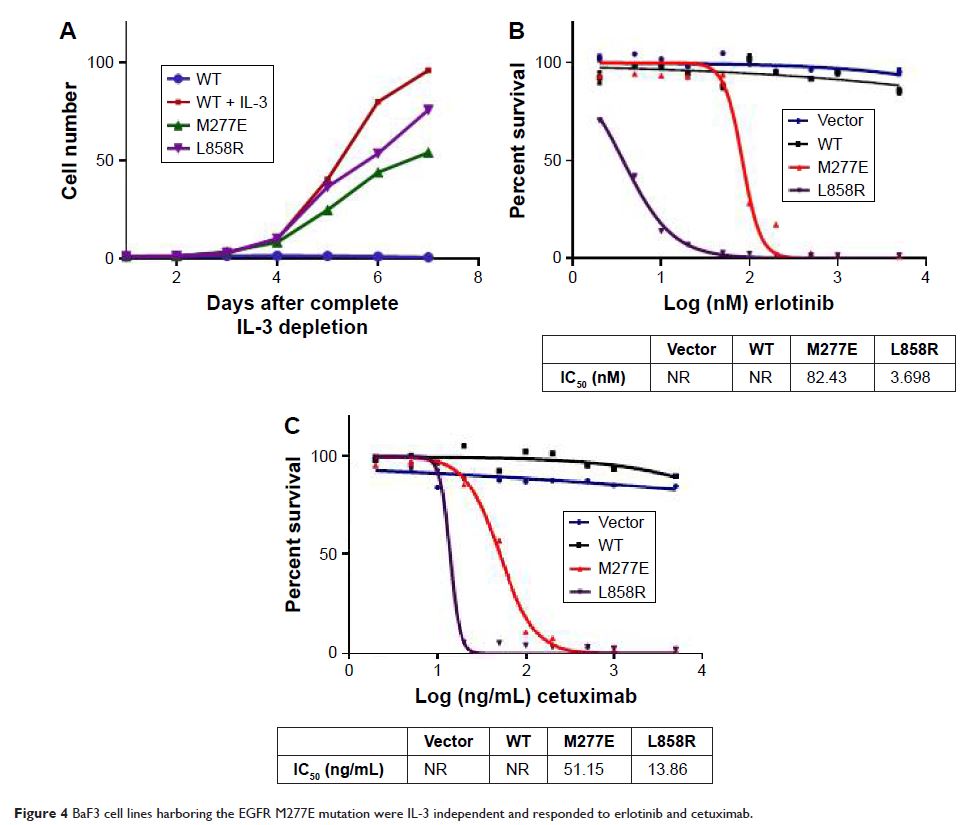109182
论文已发表
注册即可获取德孚的最新动态
IF 收录期刊
- 3.4 Breast Cancer (Dove Med Press)
- 3.2 Clin Epidemiol
- 2.6 Cancer Manag Res
- 2.9 Infect Drug Resist
- 3.7 Clin Interv Aging
- 5.1 Drug Des Dev Ther
- 3.1 Int J Chronic Obstr
- 6.6 Int J Nanomed
- 2.6 Int J Women's Health
- 2.9 Neuropsych Dis Treat
- 2.8 OncoTargets Ther
- 2.0 Patient Prefer Adher
- 2.2 Ther Clin Risk Manag
- 2.5 J Pain Res
- 3.0 Diabet Metab Synd Ob
- 3.2 Psychol Res Behav Ma
- 3.4 Nat Sci Sleep
- 1.8 Pharmgenomics Pers Med
- 2.0 Risk Manag Healthc Policy
- 4.1 J Inflamm Res
- 2.0 Int J Gen Med
- 3.4 J Hepatocell Carcinoma
- 3.0 J Asthma Allergy
- 2.2 Clin Cosmet Investig Dermatol
- 2.4 J Multidiscip Healthc

具有细胞外结构域突变 EGFR 的非小细胞肺癌,M277E,有致癌性和药物敏感性
Authors Yu S, Zhang Y, Pan YJ, Cheng C, Sun YH, Chen HQ
Received 9 January 2017
Accepted for publication 10 June 2017
Published 12 September 2017 Volume 2017:10 Pages 4507—4515
DOI https://doi.org/10.2147/OTT.S131999
Checked for plagiarism Yes
Review by Single-blind
Peer reviewers approved by Dr Ashok Kumar Pandurangan
Peer reviewer comments 6
Editor who approved publication: Dr Samir Farghaly
Purpose: To identify novel oncogenic mutations in non-small cell lung
cancer patient specimens that lack mutations in known targetable genes
(“pan-negative” patients).
Methods: Comprehensive mutational analyses were performed on
1,356 lung adenocarcinoma specimens. In this cohort of patients, common lung
cancer oncogenic driver mutations were detected in the epidermal growth factor
receptor (EGFR ) kinase domain, the human
epidermal growth factor receptor 2 kinase domain, as well as the KRAS , BRAF , ALK , ROS1 and RET genes. A sub-cohort of
pan-negative patient specimens was assayed for mutations in the EGFR
extracellular domain (ECD). Additionally, EGFR mutant NIH-3T3 stable cell lines
were constructed and assessed for protein content, anchorage-independent
growth, and tumor formation in xenograft models to identify oncogenic
mutations. BaF3 lymphocytes were also used to test sensitivities of the
mutations to tyrosine kinase inhibitors.
Results: In pan-negative lung adenocarcinoma cases, a
novel oncogenic EGFR ECD mutation was identified (M277E). EGFR M277E mutations
encoded oncoproteins that transformed NIH-3T3 cells to grow in the absence of
exogenous epidermal growth factor. Transformation was further evidenced by
anchorage-independent growth and tumor formation in immunocompromised xenograft
mouse models. Finally, as seen in the canonical EGFR L858R mutation, the M277E
mutation conferred sensitivity to both erlotinib and cetuximab in BaF3 cell
lines and to erlotinib in xenograft models.
Conclusion: Here, a new EGFR driver mutation, M277E, was
identified in the ECD of a lung adenocarcinoma specimen. For patients with
M277E-mutant lung adenocarcinoma who experienced disease recurrence, treatment
with an EGFR tyrosine kinase inhibitor may predict good prognosis.
Keywords: EGFR
extracellular domain mutation, non-small cell lung cancer, oncogene, drug
sensitive
